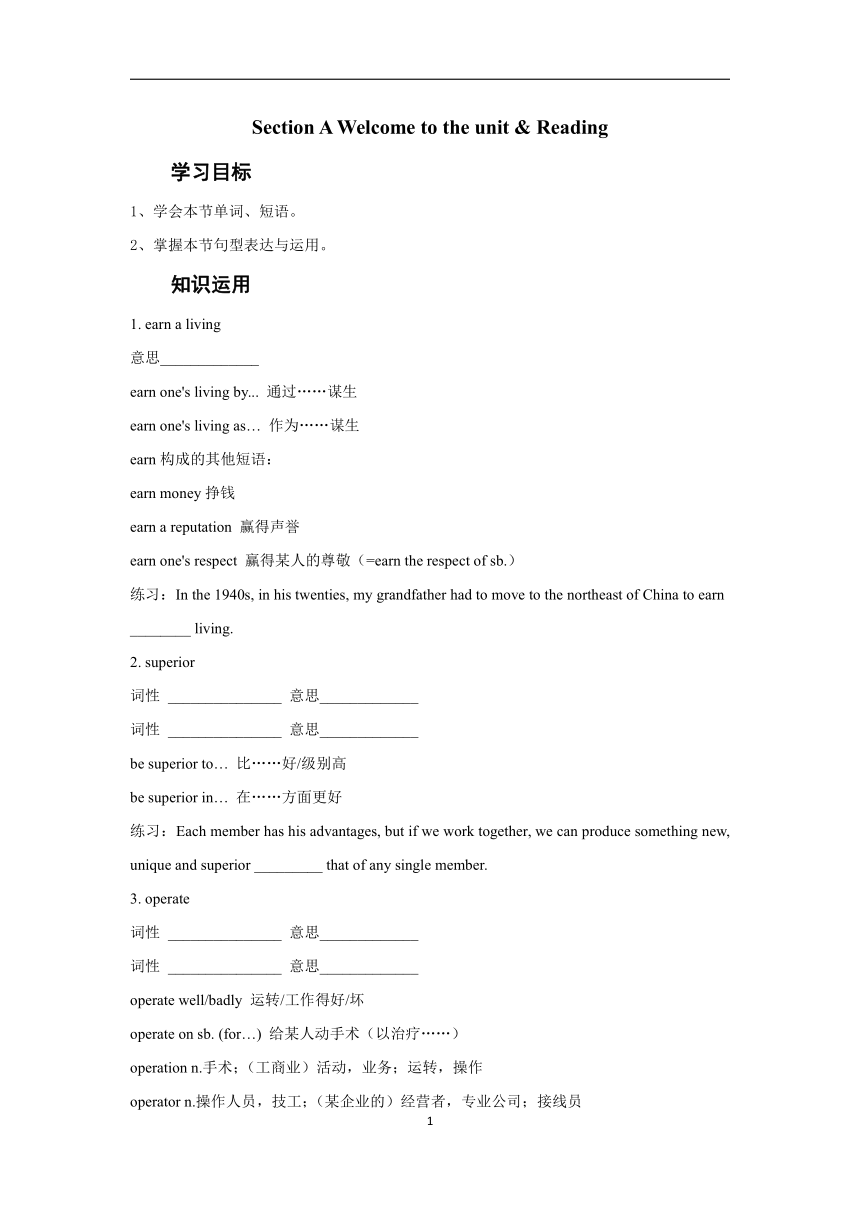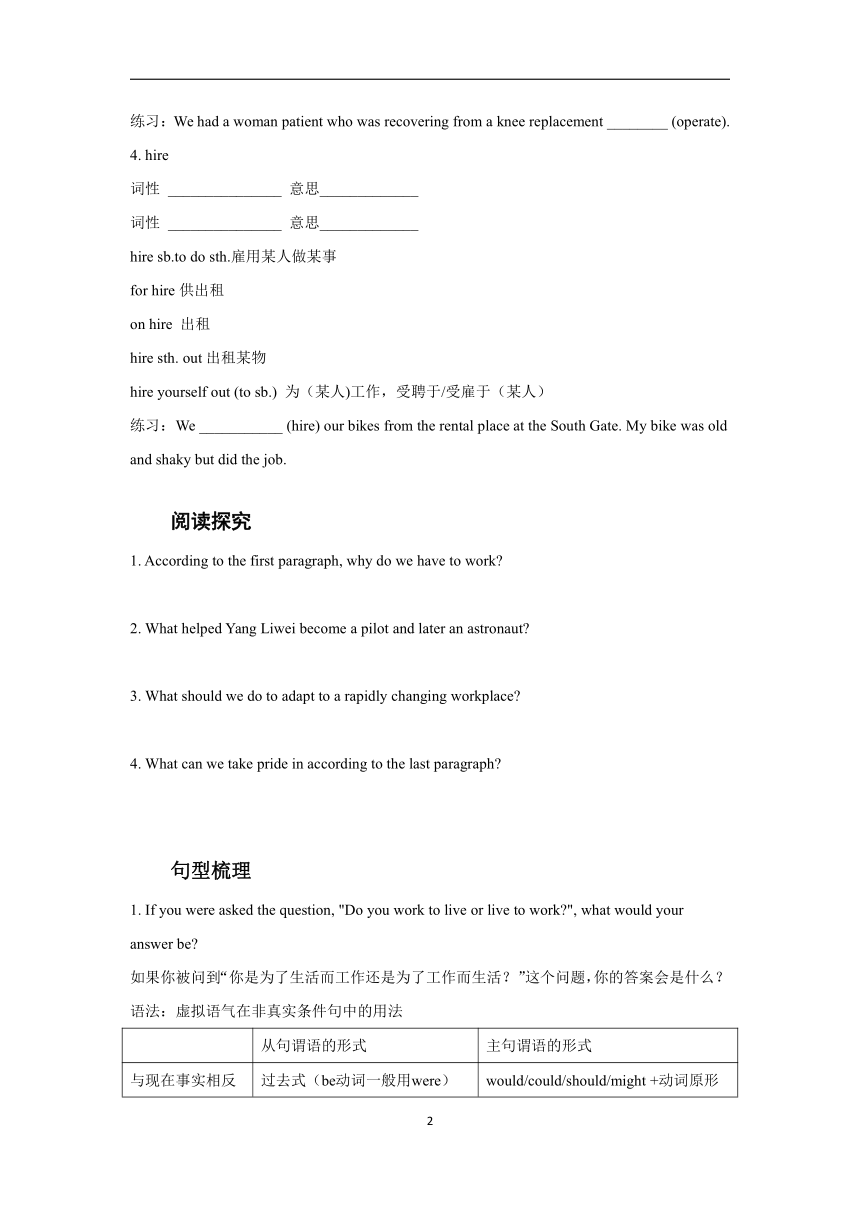牛津译林版(2019)选择性必修 第四册Unit 3 Careers and skills Section A Welcome to the unit & Reading学案(含答案)
文档属性
| 名称 | 牛津译林版(2019)选择性必修 第四册Unit 3 Careers and skills Section A Welcome to the unit & Reading学案(含答案) |  | |
| 格式 | doc | ||
| 文件大小 | 48.5KB | ||
| 资源类型 | 教案 | ||
| 版本资源 | 牛津译林版(2019) | ||
| 科目 | 英语 | ||
| 更新时间 | 2022-10-10 16:45:10 | ||
图片预览


文档简介
Section A Welcome to the unit & Reading
学习目标
1、学会本节单词、短语。
2、掌握本节句型表达与运用。
知识运用
1. earn a living
意思_____________
earn one's living by... 通过……谋生
earn one's living as… 作为……谋生
earn构成的其他短语:
earn money挣钱
earn a reputation 赢得声誉
earn one's respect 赢得某人的尊敬(=earn the respect of sb.)
练习:In the 1940s, in his twenties, my grandfather had to move to the northeast of China to earn ________ living.
2. superior
词性 _______________ 意思_____________
词性 _______________ 意思_____________
be superior to… 比……好/级别高
be superior in… 在……方面更好
练习:Each member has his advantages, but if we work together, we can produce something new, unique and superior _________ that of any single member.
3. operate
词性 _______________ 意思_____________
词性 _______________ 意思_____________
operate well/badly 运转/工作得好/坏
operate on sb. (for…) 给某人动手术(以治疗……)
operation n.手术;(工商业)活动,业务;运转,操作
operator n.操作人员,技工;(某企业的)经营者,专业公司;接线员
练习:We had a woman patient who was recovering from a knee replacement ________ (operate).
4. hire
词性 _______________ 意思_____________
词性 _______________ 意思_____________
hire sb.to do sth.雇用某人做某事
for hire供出租
on hire 出租
hire sth. out出租某物
hire yourself out (to sb.) 为(某人)工作,受聘于/受雇于(某人)
练习:We ___________ (hire) our bikes from the rental place at the South Gate. My bike was old and shaky but did the job.
阅读探究
1. According to the first paragraph, why do we have to work
2. What helped Yang Liwei become a pilot and later an astronaut
3. What should we do to adapt to a rapidly changing workplace
4. What can we take pride in according to the last paragraph
句型梳理
1. If you were asked the question, "Do you work to live or live to work ", what would your answer be
如果你被问到“你是为了生活而工作还是为了工作而生活?”这个问题,你的答案会是什么?
语法:虚拟语气在非真实条件句中的用法
从句谓语的形式 主句谓语的形式
与现在事实相反 过去式(be动词一般用were) would/could/should/might +动词原形
与过去事实相反 had+过去分词 would/could/should/might have +过去分词
与将来事实相反 A.过去式(be动词一般用were)B.were to +动词原形C.should+动词原形 would/could/should/might +动词原形
If I lived near my office, I would walk to work.
我如果住在办公室附近,就会步行去上班。(与现在事实相反)
If I were you, I would plant some trees round the house.
我如果是你,就会在房子周围种些树。(与现在事实相反)
If you had arrived a little earlier, you would have seen her.
你如果早到一会儿就见到她了。(与过去事实相反)
If he were to/should resign, who would take his place
如果他要辞职,谁来接替他 (与将来事实相反)
2. Not only does work benefit us personally, it also contributes to the health of society.
工作不仅有益于我们个人,也有助于社会的健康。
语法:“not only...but also...”结构
该结构意为“不仅……而且……”。具体用法如下:
用法 例句
基本用法 连接两个并列成分,如两个主语、谓语、宾语等,还可连接两个句子。 In the production, we demand not only quantity but also quality.在生产中,我们不但要求数量,而且要求质量。(连接两个宾语)Mary not only plays well but also writes music herself.玛丽不仅乐器演奏得好,还会自己创作音乐。(连接两个谓语)
主谓一致 not only A but also B作主语时,谓语动词的人称和数遵循“就近一致”原则,即以B为准。 Not only Tom and Mary but also I am fond of playing football.不仅汤姆和玛丽喜欢踢足球,我也喜欢。
倒装 not only 位于句首时,not only所在的分句要用部分倒装结构,but also所在的分句不倒装。 Not only do we take volleyball and basketball courses, but also our school holds various kinds of sports competitions.我们不仅上排球和篮球课,而且我们学校还举办各种体育比赛。
省略 一般只省略also,但在连接句子时,有时可见到省略but,甚至省略but also的情形。 Shakespeare was not only a playwright but an actor.莎士比亚不仅是一位剧作家,还是一位演员。(省略了also)Not only was I tired, I was also cold.我不光感到困倦,还觉得冷。(省略了but)Not only does he have a first-class brain, he is a very hard worker.他不仅有着一流的头脑,而且工作很努力。(省略了but also)
答案
知识运用
1. a 2. to 3. operation 4. hired
阅读探究
1. Many important reasons motivate our entry into the world of work.
2. Yang Liwei's passion for flying.
3. We should keep up and develop new skills.
4. The knowledge that hard work is essential for our individual well-being as well as for the benefit of our society as a whole.
2
学习目标
1、学会本节单词、短语。
2、掌握本节句型表达与运用。
知识运用
1. earn a living
意思_____________
earn one's living by... 通过……谋生
earn one's living as… 作为……谋生
earn构成的其他短语:
earn money挣钱
earn a reputation 赢得声誉
earn one's respect 赢得某人的尊敬(=earn the respect of sb.)
练习:In the 1940s, in his twenties, my grandfather had to move to the northeast of China to earn ________ living.
2. superior
词性 _______________ 意思_____________
词性 _______________ 意思_____________
be superior to… 比……好/级别高
be superior in… 在……方面更好
练习:Each member has his advantages, but if we work together, we can produce something new, unique and superior _________ that of any single member.
3. operate
词性 _______________ 意思_____________
词性 _______________ 意思_____________
operate well/badly 运转/工作得好/坏
operate on sb. (for…) 给某人动手术(以治疗……)
operation n.手术;(工商业)活动,业务;运转,操作
operator n.操作人员,技工;(某企业的)经营者,专业公司;接线员
练习:We had a woman patient who was recovering from a knee replacement ________ (operate).
4. hire
词性 _______________ 意思_____________
词性 _______________ 意思_____________
hire sb.to do sth.雇用某人做某事
for hire供出租
on hire 出租
hire sth. out出租某物
hire yourself out (to sb.) 为(某人)工作,受聘于/受雇于(某人)
练习:We ___________ (hire) our bikes from the rental place at the South Gate. My bike was old and shaky but did the job.
阅读探究
1. According to the first paragraph, why do we have to work
2. What helped Yang Liwei become a pilot and later an astronaut
3. What should we do to adapt to a rapidly changing workplace
4. What can we take pride in according to the last paragraph
句型梳理
1. If you were asked the question, "Do you work to live or live to work ", what would your answer be
如果你被问到“你是为了生活而工作还是为了工作而生活?”这个问题,你的答案会是什么?
语法:虚拟语气在非真实条件句中的用法
从句谓语的形式 主句谓语的形式
与现在事实相反 过去式(be动词一般用were) would/could/should/might +动词原形
与过去事实相反 had+过去分词 would/could/should/might have +过去分词
与将来事实相反 A.过去式(be动词一般用were)B.were to +动词原形C.should+动词原形 would/could/should/might +动词原形
If I lived near my office, I would walk to work.
我如果住在办公室附近,就会步行去上班。(与现在事实相反)
If I were you, I would plant some trees round the house.
我如果是你,就会在房子周围种些树。(与现在事实相反)
If you had arrived a little earlier, you would have seen her.
你如果早到一会儿就见到她了。(与过去事实相反)
If he were to/should resign, who would take his place
如果他要辞职,谁来接替他 (与将来事实相反)
2. Not only does work benefit us personally, it also contributes to the health of society.
工作不仅有益于我们个人,也有助于社会的健康。
语法:“not only...but also...”结构
该结构意为“不仅……而且……”。具体用法如下:
用法 例句
基本用法 连接两个并列成分,如两个主语、谓语、宾语等,还可连接两个句子。 In the production, we demand not only quantity but also quality.在生产中,我们不但要求数量,而且要求质量。(连接两个宾语)Mary not only plays well but also writes music herself.玛丽不仅乐器演奏得好,还会自己创作音乐。(连接两个谓语)
主谓一致 not only A but also B作主语时,谓语动词的人称和数遵循“就近一致”原则,即以B为准。 Not only Tom and Mary but also I am fond of playing football.不仅汤姆和玛丽喜欢踢足球,我也喜欢。
倒装 not only 位于句首时,not only所在的分句要用部分倒装结构,but also所在的分句不倒装。 Not only do we take volleyball and basketball courses, but also our school holds various kinds of sports competitions.我们不仅上排球和篮球课,而且我们学校还举办各种体育比赛。
省略 一般只省略also,但在连接句子时,有时可见到省略but,甚至省略but also的情形。 Shakespeare was not only a playwright but an actor.莎士比亚不仅是一位剧作家,还是一位演员。(省略了also)Not only was I tired, I was also cold.我不光感到困倦,还觉得冷。(省略了but)Not only does he have a first-class brain, he is a very hard worker.他不仅有着一流的头脑,而且工作很努力。(省略了but also)
答案
知识运用
1. a 2. to 3. operation 4. hired
阅读探究
1. Many important reasons motivate our entry into the world of work.
2. Yang Liwei's passion for flying.
3. We should keep up and develop new skills.
4. The knowledge that hard work is essential for our individual well-being as well as for the benefit of our society as a whole.
2
同课章节目录
